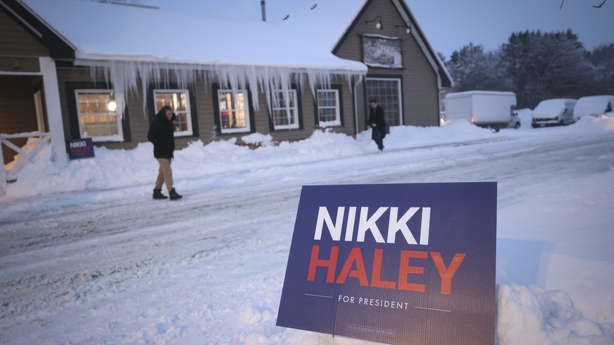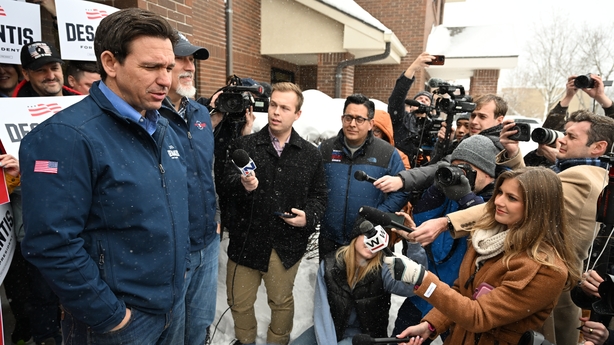Voters venture into sub-zero temperatures to kick off the Republican presidential nomination race with the Iowa caucuses, the first major test of whether front-runner Donald Trump is as much of a sure thing as he appears.
With a commanding lead in polls, the former president is expected to win the Midwestern state's first-in-the-nation vote easily as he bids to be the Republican candidate against President Joe Biden in November.
But Iowans may have to contend with the coldest conditions in the modern era of presidential election campaigns, with blizzards and a potential wind chill of -32 C forecast.
Trump canceled three weekend rallies, but is still due to hold a campaign event in Indianola, just south of Des Moines.

Despite his apparent strength, the former president has been indicted four times since he was last a candidate and is preparing for the potential collapse of his business empire in his native New York in a civil fraud trial.
"If DeSantis's massive ground effort, coupled with a recent Haley surge, can drag Trump under 50% by several points, that will be the first meaningful sign that Trump can be defeated," said political analyst Alex Avetoom, who worked on Republican John McCain's 2008 presidential campaign.
"However, this paradigm-shifting reality, that Trump could be defeated, happens if, and only if, the rest of the field consolidates behind one anti-Trump candidate," he added.
The Iowa race is hardly competitive: A new NBC News/Des Moines Register/Mediacom poll has Mr Trump at 48% among likely caucus-goers, with Ms Haley placing second but still only at 20%.
"I'm voting for Trump again," 37-year-old trucker Jeff Nikolas told AFP, adding that "he may be bullheaded, but he can actually get stuff done."
The poll was more bad news for Florida Governor DeSantis, who scored just 16% putting him third.

But Mr DeSantis insisted that his "very motivated" backers would turn out in sufficient numbers, despite the frigid conditions, to keep him relevant in a vote that is open only to registered Republicans.
In 2016, he told ABC, only 186,000 Iowans took part in the caucus, and "now, with this weather, it could be significantly less," making turnout paramount.
He urged his supporters: "Bring in friends and family, man, that's going to pack a punch."
Ms Haley, a former South Carolina governor, is looking to outperform expectations to cement her claim to be Mr Trump's top challenger going into her preferred state of New Hampshire the following week.
Iowa is a notoriously poor predictor of the eventual nominee but it is considered crucial for winnowing the field and as a springboard to the next few battlegrounds, which include Ms Haley's home state.
Following a defeat in 2016 after skipping much of Iowa's campaign trail, Mr Trump has built up a network of "precinct captains" to corral votes this time around.
In a state that likes to meet its candidates face-to-face, Mr DeSantis has campaigned in person in all 99 counties.
The Iraq veteran and conservative hard-liner will be under heavy pressure to drop out, however, if he finishes third, although Mr Avetoom cautioned against counting him out.
"Poll respondents are not necessarily Iowa caucus-goers, and the DeSantis precinct operations... are run by first-in-class operatives that have collected an impressive tally of caucus support pledges," he said.
Edward Segal, a former press secretary for Democratic and Republican politicians, echoed the benefits of a strong ground game, pointing to at least nine presidents who toured Iowa by train during campaigns.
"Whistle-stop campaign trains can still serve as eye candy to help attract the attention of voters and the media," he told AFP.
A good night for Mr Trump tomorrow, he added, would be "getting 60% or more of the vote."
The Republican primary also features a number of low-polling candidates, including biotech entrepreneur Vivek Ramaswamy, who has promised a third-place finish in Iowa but didn't qualify for the final televised debate.
Iowa's Democrats will also attend caucuses tomorrow, meetings at which local members of a political party gather to register their candidate preferences, but will vote by mail from January until March.
Mr Biden is expected to comfortably defeat self-help author Marianne Williamson and Minnesota congressman Dean Phillips.
